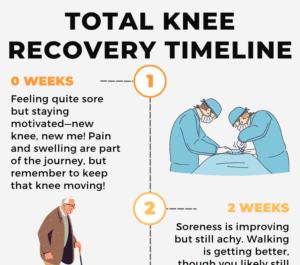Knee replacement surgery is an exciting step toward a more active and pain-free life, but achieving the best outcome takes effort, planning, and a bit of patience. While the procedure itself lays the groundwork, what happens before and after surgery can significantly influence your success. Let’s explore the key factors that shape your recovery and long-term satisfaction.
Surgical Success Rates
Roughly 80% of patients experience significant pain relief and improved knee function after undergoing a total knee replacement. That means for the vast majority of people, this surgery is a reliable and life-changing solution.
1. Surgical Technique and Expertise
Your surgeon’s skill is one of the most important factors in your knee replacement journey. Surgeons who specialize in joint replacement and stay updated on minimally invasive techniques often deliver better outcomes. These approaches can reduce tissue damage, speed up healing, and lessen discomfort.
Pro Tip: When choosing a surgeon, don’t hesitate to ask about their experience, the number of procedures they’ve performed, and the techniques they use. It’s your knee, and you deserve to feel confident in your care team!
2. Post-Surgical Care: A Strong Start
The days and weeks following surgery are critical for setting the tone of your recovery. Proper pain management, caring for your incision, and following discharge instructions can prevent complications like infections or blood clots.
What You Can Do:
-
Keep your incision clean and dry.
-
Take prescribed medications as directed.
-
Stay in touch with your surgeon if you notice unusual swelling, redness, or pain.
3. Rehabilitation and Physical Therapy: The Backbone of Recovery
Rehabilitation is where the magic happens. Physical therapy helps you regain strength, flexibility, and mobility, allowing your new knee to function at its best. Your therapist will guide you through exercises designed to:
-
Improve range of motion.
-
Build strength in surrounding muscles.
-
Reintegrate into daily activities safely.
Stick With It: Following your rehab plan consistently—even on tough days—is key to ensuring long-term success. Think of it as an investment in your future mobility.
4. Age Isn’t Just a Number
While younger patients may recover faster due to fewer age-related health conditions, anyone can achieve great results with the right mindset and dedication. Your commitment to following recovery protocols often outweighs the number on your birth certificate.
5. Overall Health: Set Yourself Up for Success
Your general health plays a significant role in how quickly and smoothly you recover. Chronic conditions like diabetes, high blood pressure, or obesity can slow down the healing process. Taking proactive steps to manage these conditions before surgery can make a big difference.
Healthy Habits to Adopt:
-
Control blood sugar levels.
-
Maintain a healthy weight.
-
Eat a balanced diet rich in nutrients to support healing.
6. Lifestyle Choices: Your Recovery Allies
Your habits before and after surgery are critical. Smoking, for example, can impair blood flow and delay healing, while a sedentary lifestyle can weaken muscles needed to support your new joint.
Recovery Boosters:
-
Quit smoking—it’s never too late to improve circulation and healing.
-
Incorporate light activities like walking to build strength and keep your knee moving.
7. The Mental Game
Your mindset can be as important as your physical health. Staying positive and proactive can help you stay on track with your rehab program and face challenges with resilience. Managing stress and celebrating small wins can make the journey feel more manageable.
Ways to Stay Positive:
-
Set achievable goals to track your progress.
-
Lean on your support system of friends, family, and healthcare professionals.
-
Practice mindfulness or relaxation techniques to reduce stress.
What to Expect After Surgery
-
Pain Reduction
Say goodbye to that constant knee pain! Many patients report feeling nearly pain-free after their full recovery, allowing them to enjoy daily activities with ease. -
Functional Improvement
Your new knee isn’t just about reducing pain—it’s about gaining freedom. Expect better range of motion, smoother walking, and the ability to tackle stairs without wincing. -
Patient Satisfaction
The numbers don’t lie: total knee replacement boasts high satisfaction rates. Most patients are thrilled with the improvements in their day-to-day lives, from walking the dog to enjoying a leisurely hike. -
Return to Normal Activities
Once your recovery is complete, you’ll likely be able to get back to regular activities like walking, light recreation, and even climbing stairs. Some patients even find themselves taking up new hobbies they couldn’t manage before.
Therapeutic Edge
The success of your knee replacement surgery goes beyond the procedure—it heavily relies on the skill and experience of your surgeon. Here’s a pro tip: consult a physical therapist. They work closely with patients from various surgeons in your area and can offer firsthand insights into who consistently achieves the best results. This insider perspective is often more reliable than online reviews or hospital ratings. Remember, knee replacement surgery is a team effort. Your surgeon, physical therapist, and your own commitment all play critical roles in achieving the best outcome. By focusing on these factors, you can maximize your recovery and get back to the activities you love!










